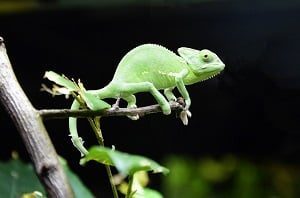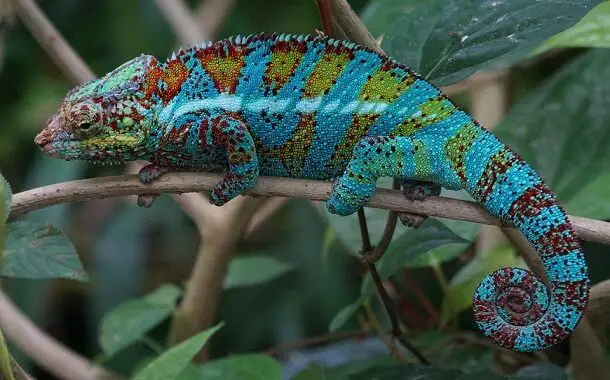How Much Does a Chameleon Cost?
Last Updated on February 1, 2024
Written by CPA Alec Pow | Content Reviewed by ![]() CFA Alexander Popinker
CFA Alexander Popinker
Chameleons are exotic and exciting pets that have recently surged in popularity. Their ability to change colors, captivating eyes, and alien-like appearance make them fascinating creatures.
However, chameleons require specialized care and a significant financial investment. Understanding the costs of purchasing and properly caring for a chameleon is critical before bringing one of these exotic pets home.
This article will break down the key expenses of chameleon ownership, from the initial habitat setup to ongoing food and healthcare costs. After reading, you’ll have a detailed understanding of what’s required financially to give a chameleon a healthy, enriching life.
Highlights
- Expect to pay $50-$300 for common pet chameleons
- Budget $400-$600 for initial habitat setup
- Ongoing monthly care costs are $50+
- Proper environment and care is vital for health
- Chameleons live 5-10 years so are a long commitment
- Research costs and care before purchasing
How Much Does a Chameleon Cost?
Chameleons range dramatically in purchase price depending on species, age, color, and rarity. Expect to spend $30-$300 for common pet chameleon species like veiled, panther, or Jackson’s chameleons when purchased as juveniles. Male chameleons often cost more than females.
Rarer or more specialized species can cost from $200 up to $2000. The general price range for most pet chameleon species when purchased as juveniles is $50-$150.
Baby chameleons are generally cheaper than adults, with prices for babies ranging from $20-$60. Older, adult chameleons are typically $60-$200.
LLLReptile, for example, offers a varied selection of chameleons with prices ranging from $36.99 to $400. Specific examples include:
- Baby Veiled Chameleons: $36.99 (female) – $46.99 (male)
- Baby Low White Piebald Veiled Chameleons: $59.99 (female) – $69.99 (male)
- Rainbow Jackson Chameleons: $94.95
- Madagascar Panther Chameleons: Starting from $199.95
BigAppleHerp provides chameleons for sale with prices starting from $59.00. Specific examples include:
- Veiled Chameleons: From $59.00
- Rainbow Jackson Chameleons: $94.95
- Madagascar Panther Chameleons: Starting from $199.95
Local pet stores, reptile expos, and breeders are other common places to buy chameleons. The purchase price varies between these sources.
What Influences the Cost of a Chameleon?
Many factors impact the price of a chameleon. The most important are:
Species
Popular pet species like veiled chameleons ($50-$150) and panther chameleons ($80-$200) are most affordable. Rarer species like the Meller’s chameleon can cost $1500+.
Age
Younger chameleons are cheaper, while mature adults command higher prices. Adults may be worth it for their more predictable temperament.
Color and Morphs
Chameleons with rare or vibrant colors like red, blue or yellow can cost twice as much as their normal colored counterparts.
Captive vs Wild Caught
Captive bred chameleons are less stressed, healthier, and cost more than imported wild caught specimens. Captive bred is best.
Gender
For many species, vibrantly colored males cost $25-$50 more than females.
Breeder Reputation
Chameleons from reputable breeders trained in genetics and captive breeding practices tend to cost more.
Check out our articles about the cost of a tarantula, a pet octopus, or an iguana.
Initial Setup Costs
 The initial habitat setup represents a significant investment for a new chameleon owner. Costs include:
The initial habitat setup represents a significant investment for a new chameleon owner. Costs include:
- Enclosure: Glass or screen reptile terrarium $100-$300
- Lighting & Heating: Heat and UVB bulbs $50-$150
- Plants & Decor: Live or artificial plants, branches, etc $50-$100
- Substrate: reptile carpet, soil, moss $20-$50
- Water system: dripper, mister, glass $30-$60
- Supplements & vitamins: calcium, vitamin powder $20-$30
Expect an initial investment between $400-$600 to properly setup your chameleon’s habitat. This provides an enriching environment supporting their health and wellbeing. Cut costs by buying used supplies.
Ongoing Care & Maintenance Expenses
Caring for a chameleon extends far beyond just the initial habitat purchase. Regular expenses include:
- Food costs: Crickets, roaches, worms $10-$30 monthly
- Supplement replenishment: Calcium, vitamins $10-$15 monthly
- Healthcare: Vet visits & medical treatment $100+ yearly
- Habitat maintenance: New plants, cleaning supplies $20+ monthly
- Utility costs: Increased electricity, water $5-$15 monthly
Budget at least $50 per month for a single chameleon’s care, not including vet costs. Exotic pet insurance can offset healthcare expenses.
Choosing the Right Chameleon
Selecting a chameleon species you can properly care for within your budget is critical. Good starter species include:
- Veiled chameleons: Hardy, inexpensive, wide range of colors $50-$150
- Panther chameleons: Vibrant, medium maintenance $80-$200
- Jackson’s chameleons: Affordable, docile nature $70-$120
Avoid chameleons like Meller’s, pygmy leaf, or carpets that require advanced care. Seek captive bred babies or juveniles for best health and temperament.
Where to Purchase a Chameleon
Finding a healthy chameleon from a reputable source is essential. Purchase captive bred specimens from:
- Specialty breeders: Expert genetics, health guarantees $100-$300
- Reptile expos: Meet sellers in person, compare options $50-$200
- Pet stores: Convenient but mixed reputations $30-$150
- Online: Risky shipping, hard to evaluate health $30-$500
Inspect any chameleon for weight, energy, clear eyes, and healthy skin before purchasing. Get age, diet, and care history.
The Importance of Proper Habitat & Care
Chameleons require specialized care different from typical pets. Proper habitat setup, heating, lighting, food, and breeder vet approved supplements are vital for their health and longevity as exotic pets.
While the initial cost may be high, investing in the right habitat and committing to diligent care reaps huge benefits through years of enjoying your healthy, thriving chameleon.
Long-Term Considerations in Chameleon Ownership
Chameleons can live 5-10 years with proper care. Be ready for a long-term commitment caring for an exotic pet. Budget increased costs as they age for healthcare and an eventual larger habitat.
Also factor in boarding costs for whenever you travel. Make sure you have an exotic pet friendly home that allows reptiles before bringing home your chameleon.
While not cheap pets, chameleons reward dedicated owners with years of fascination, enjoyment and enrichment. Do plenty of research to make sure you can cover the costs of ownership before getting a chameleon.
How to Spend Less on a Chameleon
Here are great tips to save money on your pet chameleon:
- Buy younger juveniles which cost less
- Choose common beginner species like veiled or panther chameleons
- Buy used habitat supplies when possible
- Join chameleon owner Facebook groups to find deals
- Buy feeder insects in bulk online at lower prices
- Grow your own chameleon-safe plants
- Make your own lizard habitat decor like branches and vines
- Learn to do basic veterinary care yourself
Chameleon Care FAQs
Are chameleons good pets?
Chameleons can make fascinating and interactive pets when cared for properly. Their unique traits like color changing, eye turrets, grasping tails, and insectivore diets give them very non-traditional pet appeal.
However, prospective owners need to be prepared for the complex care and sensitive health needs of this animal. Do thorough research on the species you want and how to set up the proper habitat and nutrition before getting a chameleon as a pet.
When their needs are met, chameleons have great behavior, respond well to regular gentle handling and can bond closely with owners. Make sure you are ready for a 5-10-year commitment with constant feeding before getting a chameleon.
Is it OK to hold chameleons?
You can hold your chameleon for short periods with some gentle handling training. Chameleons are prone to stress when restrained and should not be over-handled. Start by having them crawl slowly between your hands.
Next, allow them to perch on your arm or shoulder. Limit handling to 10 minutes per day. Always support their body fully when holding and never squeeze.
Let them grasp your finger voluntarily. Stay low to the ground in case they jump off. Proper handling lets you bond with your chameleon while ensuring their safety and reducing stress.
Do chameleons smell?
Chameleons themselves do not smell, but their enclosures need regular cleaning to prevent odors. Spot clean poop daily and change water often. Deep clean the entire habitat every 2-4 weeks to prevent bad smells from accumulating.


Leave a Reply
Want to join the discussion?Feel free to contribute!